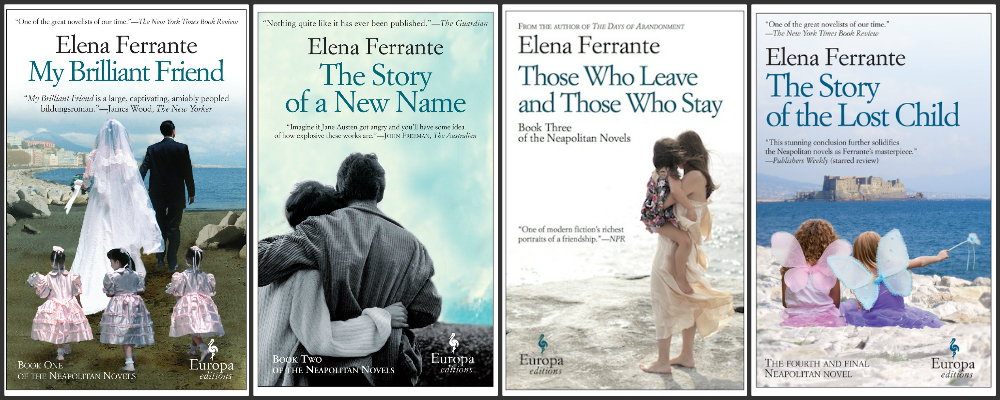Ferrante Fever (2)

Coincident with the September 1st launch of the fourth and final installment of Elena Ferrante’s NEAPOLITAN NOVEL (if you haven’t read them yet, I recommend that you do so immediately), a flurry of reviews, articles and interviews were published. For those of you new to Ferrante, she is an Italian novelist who writes under a pen name and refuses to give in-person interviews or to do public readings, book signings or any other of the promotional work required of authors. (She is NOT on Facebook or Twitter either.)
There was an excellent interview in VANITY FAIR Magazine that started by describing the literary wars going on in Brooklyn: Karl Ove Knausgaard versus Elena Ferrante. Knausgaard is a Norwegian writer who produced a six-volume autobiographical novel entitled MY STRUGGLE. I asked a clerk at the cash register of Book Culture, our local independent bookseller, if there had been arguments among staff about the merits of the two authors—both of them having written recent much praised bestselling multi-volume autobiographical novels. Yes, she told me, each of the authors had passionate champions. I asked, “Does it break down along gender lines?” She said, “No.” But the woman behind the next register said, “Are you kidding? The women prefer Ferrante, and the men swear by Knausgaard.”
Having read all of Ferrante’s novels now available in English, and having made it through two and one half books of Knausgaard’s MY STRUGGLE, I know where my loyalties lie, although I do admire both works.
The London Review Bookshop posted on their blog a letter Ferrante wrote to her publisher before the launch of her first novel in 1991. Her words on book promotion were bracing and funny:
“I do not intend to do anything for TROUBLING LOVE, anything that might involve the public engagement of me personally. I’ve already done enough for this long story: I wrote it. If the book is worth anything, that should be sufficient. I won’t participate in discussions and conferences, if I’m invited. I won’t go and accept prizes, if any are awarded to me. I will never promote the book, especially on television, not in Italy or, as the case may be, abroad. I will be interviewed only in writing, but I would prefer to limit even that to the indispensable minimum.”
Slate published a short piece about the publisher’s decision to use “low-class” images on Ferrante’s novels, and the author’s acquiescence in this decision. The Economist ran a piece about how “a four-volume feminist novel has become an unlikely global hit.” The Atlantic published an interview with Ferrante’s American translator. And then cap it all off and prove how mainstream #FerranteFever had become, Entertainment Weekly ran an interview with the writer.
I won’t catalogue the many ecstatic reviews (you can look those up yourself), but after reading the novels, you might want to visit Ischia, an island off Naples where the novel’s narrator and heroine Elena spends time in the summer, and you might want to check out a travel piece about the place from The Guardian (with requisite quotations from the books). I’m dreaming of a trip to Naples, and hope by the time I get there an entrepreneurial guide will have a devised a walking tour of Ferrante’s City.
At this point, I have over a dozen friends and family members who have read and loved MY BRILLIANT FRIEND and the other books in the series. I’m thinking of hosting a #FerranteFever dinner in a few weeks after everyone has finished book four so we can discuss the puzzling, maddening and probably brilliant ending (don’t worry—no spoilers here!).
Nancy Kricorian
New York City
September 23, 2015